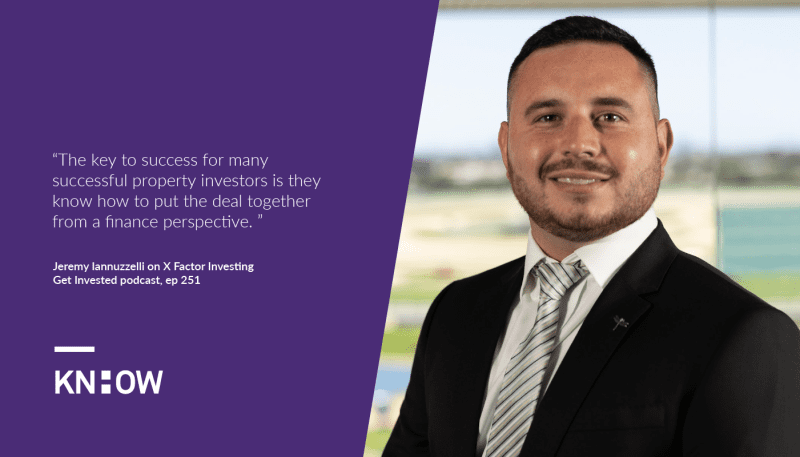Jeremy Iannuzzelli says success in property investing comes from strategically managing your money and understanding finance.
The specialist property accountant and property investor is a pro at elevating investors to the next level.
He joined KnowHow founder Bushy Martin on the Get Invested to talk about how the best investors have the right structures and money management processes in place.
Investing in your financial education
Jeremy explained that investors will struggle to take their property portfolio to the next level without a sound understanding of how finance works.
“The key to success for me is understanding finance. No doubt about it, the right property is important. But when people can’t get from three to four to five properties, it’s not because they don’t want to or the desire is not there, it’s that they haven’t surrounded themselves with good people from a finance perspective that can give them all the ins and outs. So for me, I really try to understand how finance works,” he said.
“You can do that yourself. Or, you can do that with a very good strategic mortgage broker or finance specialist, and they’ll help give you the ins and outs of what properties are unfortunately lacking in the borrowing capacity calculations, and how structures come into play.”
Structuring finances to improve capabilities with banks
The biggest stakeholder in your portfolio will be the bank. Therefore, presenting your finances strategically will ensure you have great capabilities with money.
“Many banks are the biggest stakeholders in my portfolio. Without them, I can’t achieve the things I’ve been able to achieve, and I won’t be able to achieve the things that I want to achieve. So I always encourage people to, yes, get good at buying properties, but get even better at putting finance together,” Jeremy said.
“The key to success for many successful property investors is they know how to put the deal together from a finance perspective. If you can get a bank to back you, and if you can make your numbers look favourable from a banking perspective, then you’re good as gold and you’re unstoppable.
“I’ve really educated myself on buying with different structures, whether it’s a self-managed super fund or trust. I’ve understood different banking policies, especially from a trust perspective. There are some banks out there where if you have a trust that’s positively geared, not requiring any further capital from the trustee or the beneficiaries, and it’s self-sustaining, then in most cases, depending on the entity that you’re buying the next property in, they’ll ignore the loans in that trust. So that’s a way that myself and many other successful investors have been able to overcome the hurdles of finance and overcome the hurdles of borrowing and and continue to buy.”
Knowing your numbers as a property investor
The biggest mistake investors can suffer from is not looking at their numbers close enough and understanding all the costs which come from purchasing a property.
“They look at the gross rent, but then they tend not to look at the net expenses that will still remain there, and how that impacts the gross rent. So say someone bought the property for $100k, so it gets 10% return which $10,000 gross rent. They don’t focus on the $2,000 council rates that will go straight away. So that’s 2% of your gross rent going. Then another $1500 is your water, insurance is $2000, and all of sudden you’ve got 5% of your 10% going out the door,” Jeremy explained.
“Then you’ve got to add property management fees, repairs and maintenance. Unfortunately, a kitchen in a $100,000 house will probably cost you the same as a kitchen in a $300,000 house. And I see a lot of these net yields for some of these properties actually go to negative net yields, and that’s before interest rates are even paid.
“So I try to really encourage people to look at, what is the underlying net yield? Because many people who bought property in that boom that has just recently gone through across Australia were buying properties at a 2.5% to 3% gross yield. Sounds alright when interest rates are low, but you take into account the costs associated with running that property, then all of a sudden the net yield comes to about 1.5% to 1.2%.”
How property investors can build on momentum
Once you have good momentum on your investment journey, Jeremy said you need to work hard to sustain it.
“Momentum is probably the biggest thing. Successful investors will continue the momentum. I feel that when life gets in the way and people have a very long break, they tend not to get back into it because it’s not easy being in a property business and being a property investor. It’s very stressful. You’re dealing with tenants, property managers and tradesmen. You’re dealing with many different facets that go into owning property. And I feel that if you sometimes take the foot off the pedal, it’s very hard to start the engine again,” Jeremy said.
A big part of maintaining your motivation is having an expert team around you.
“You’ve got to make sure you keep connected with the good professionals around you, and that you learn from them and continue your education. The property market changes very quickly, so no matter where you are in your journey, just keeping a finger on the pulse is always important,” he said.
Listen to the full interview here.
Want to Know How you can build wealth with the help of leading, qualified experts? Check us out and talk to the team, now.




